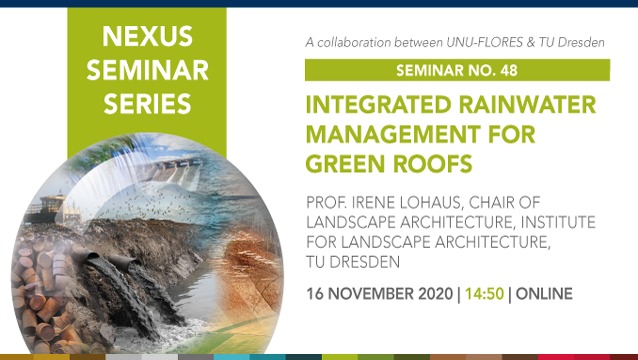
- This event has passed.
Integrated Rainwater Management for Green Roofs
November 16, 2020 @ 2:30 pm - 3:30 pm CET

Green roofs are an important component of the German adaptation strategy to climate change. Green roofs can contribute to improving the thermal environment in urban areas, with the cooling effect through evapotranspiration being an important aspect. The use of this evapotranspiration capacity during longer periods of drought and heat is severely restricted by limited retention capacity of the currently frequently used low layered forms of green roofs. This can be counteracted by increasing the layer structure and supplementary irrigation. For reasons of sustainability and economy, however, the use of drinking water is not practical.
The interdisciplinary research project started in December 2019 by the Chair of Landscape Architecture and other professorships of TU Dresden is therefore investigating the possibilities and challenges of irrigation with treated grey water, which is available all year round in building circuits, using the example of the so-called simple intensive green roofs, which have been little researched to date. A total of 21 experimental plots in three exposure situations on a roof in the Botanical Garden of TU Dresden were instrumented to record the water, heat, and material balance in the roof structure in order to compare the effects of different irrigation and lighting regimes.
The results should provide information about the extent of the effect of irrigation on the retention capacity, the evapotranspiration potential, and the building climate as well as the appearance of green roofs with simple intensive greening. From the results, planning approaches as well as the basis for simulation models will be derived in order to use irrigated green roofs purposefully in urban climate protection and water management as well as to use building climatic effects and positive effects on biodiversity and design. The establishment of this research facility was financed by the DFG, and the current series of studies is funded by the DBU.
 Greenroofs.comConnecting the Planet + Living Architecture
Greenroofs.comConnecting the Planet + Living Architecture


